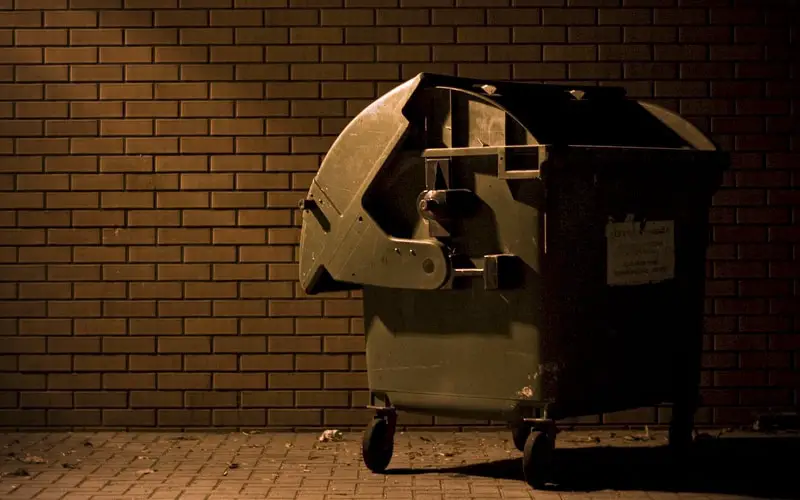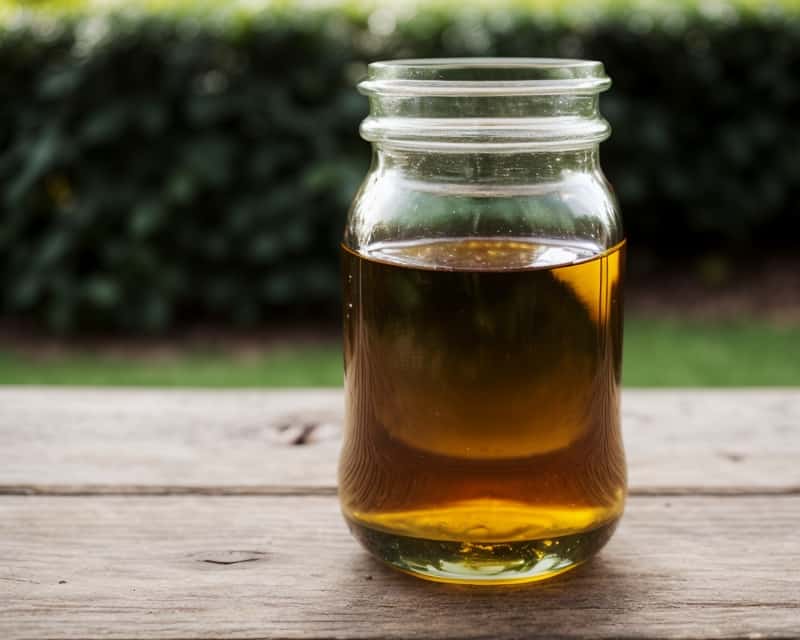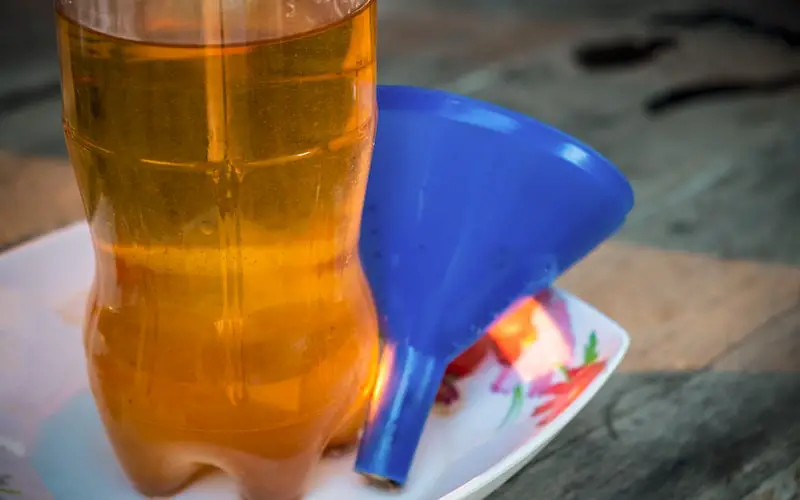Have you ever stopped to ponder the gloopy aftermath of your latest barbecue bash? I’m talking about that pesky pool of griddle grease or cooking oil that you’re left staring at once the sizzle has settled.
It’s a head-scratcher, right? But fret not! Today, we’re diving deep into the oily unknown to shed light on the art of how to properly dispose of griddle grease.
Now, it’s easy to overlook the importance of correctly handling this greasy gunk, but you’d be surprised how crucial it is.
If you are here for the quick answer:
The easiest way to dispose of griddle grease is to collect it over time in a sealable container and then dispose of it with household trash.
But let’s not stop here as there is more to learn.
From the do’s and don’ts to the tips and tricks, I’ll walk you through everything you need to know. Let’s jump right in and turn this slippery slope into a walk in the park!
Table of Contents
- The Don’ts: Pouring Grease Down the Drain
- The DIY Reuse: Straining and Saving Grease
- Grease Disposal in Household Garbage
- Recycling of Cooking Oils and Grease
- Composting
- Conclusion
- FAQ
The Don’ts: Pouring Grease Down the Drain
Picture this, you’ve just conquered another cookout. Your guests are full and happy, and you’re feeling like a true grill master. You look at your griddle, there sits a puddle of grease and you think, “Ah, it’s liquid, down the drain it goes.”
Stop right there! Let’s park that idea at the curb, my friend. Here’s why.
Pouring that grease down your drain may seem harmless – a liquid disappearing into oblivion – but as it cools down, it solidifies and it can clog up the pipes. Before you know it, you’ve got yourself a homemade fatberg right in your drain pipes.
Not a pleasant thought, eh?
And it’s not just about your pipes. The sewer lines in your neighborhood aren’t equipped to handle that greasy stuff either. Think about it like this: pouring grease down the drain is like sticking chewing gum in someone’s hair. It’s messy, it sticks to everything, and it’s a nightmare to get out.
So, next time you think about taking the easy route and dumping the griddle grease down the sink, remember the havoc it wreaks on both your private and municipal sewer lines. Trust me, your pipes (and the local sewer department) will thank you!
The DIY Reuse: Straining and Saving Grease
Alright, let’s take a step towards resourcefulness. If you love cooking just as much as I do, you’d agree that some types of griddle grease, like the ever-delicious bacon grease, are simply too good to toss. The flavors packed in that liquid gold can be a great addition to your future culinary exploits. That’s where the DIY Reuse Method shines.
Here’s a step-by-step breakdown of the process:
- Let the Grease Cool, But Not Completely: After cooking, allow your griddle grease to cool a bit. It doesn’t need to be cold, but it should be cool enough to handle safely.
- Strain the Grease: Pour the slightly cooled grease through a strainer into a clean, heat-proof jar. This gets rid of any solid bits and gives you clear, reusable grease.
- Store for Future Use: Secure the jar with a lid and store it in a cool, dark place. This homemade cooking fat is now ready for your next cooking session.
The benefits of this method are twofold.
Not only do you cut down on waste, but you also stock up on delicious cooking fat that’s brimming with flavors. It’s all about seeing the potential in our leftovers and making the most of our resources.
Grease Disposal in Household Garbage

Now, not all grease is meant for reuse. Some of it, frankly, has served its purpose and needs to be disposed of properly. An easy and effective way to do this is by collecting the grease and then throwing it out with household garbage. The process is pretty simple but does require some care.
First, you’ll need a container to collect the grease. Sealable containers like Mason jars work great for this. You can even use a PET bottle but you will need a funnel to pour the liquid inside. The goal is to avoid leaks and spills, so make sure whatever you use has a tight lid. If you don’t want to use something t, you can get a special grease container with an integrated strainer.
Once you’ve got your container sorted, it’s time to pour in the grease. Be sure it’s cooled down enough to handle safely – remember, hot grease can cause burns.
Most griddles have a grease drip hole or trough through which the grease is directed towards the drip tray that’s usually lined with a disposable aluminum foil pan. All you have to do is to pour the contents of the foil pan into the jar.
Keep filling up the jar with each grilling session. Eventually, the day will come when the jar is full. When that happens, just seal it tight, say your goodbyes, and toss it into the trash.

By following this simple process, you can prevent potential pipe blockages and environmental harm. It’s a small act, but every bit helps in maintaining a happier planet.
Recycling of Cooking Oils and Grease
Now that we’ve mastered the art of reusing grease and tossing it in the trash, let’s explore another eco-friendly option: recycling.
I know what you’re thinking. “Recycling? For griddle grease?” Yep, you heard it right. It might sound out of the ordinary, but recycling centers for cooking oils and grease are more common than you’d think.
Here’s where it gets exciting. There’s this nifty little site – www.recyclerfinder.com. This website is like a treasure map for recycling enthusiasts. You plug in your location and it’ll guide you to the nearest recycling center that happily accepts your used cooking oils and grease.
So, instead of throwing that greasy gunk in the trash, why not give it a new lease on life? It could be turned into biodiesel or other recycled products, and you get to pat yourself on the back for making an eco-friendly choice. It’s a greasy job, but someone’s gotta do it, right?
Composting
What if you’re left with just a small smudge of griddle grease after a cookout? It seems too insignificant to go through the trouble of collecting it in a jar or even recycling it. You’re not alone in that thought. Luckily, there’s a solution for even these small amounts: composting.
Now, while composting grease and cooking oil isn’t something you should be doing regularly, throwing a single oily paper towel onto the compost pile won’t do any harm.
Grab a paper towel and wipe up the leftover griddle grease, soaking it into the towel. Paper towels with a bit of grease on them break down in compost piles without a hitch. The trick is not to go overboard with the grease – only minimal amounts should be disposed of this way.
Do not pour a whole jar of oil on your compost pile! Also, remember we are talking about cooking oil. Motor oil or grease should never come anywhere near your compost bin!
Conclusion
Well, there you have it, folks! Your guide to disposing of griddle grease is the responsible way. By taking these steps, you’ll not only be extending the life of your plumbing but also doing your bit for the environment.
So, next time you’re facing down that greasy aftermath of a barbecue, remember: whether it’s reusing, recycling, composting, or trash disposal, you’ve got a world of options to choose from.
Until next time, happy grilling and even happier cleaning!
FAQ
Can I pour griddle grease down the toilet instead of the sink?
Nope, sorry. Just like your sink, pouring grease down the toilet can cause serious clogging issues. It’s best to avoid pouring it down any drains in your home.
Can I put griddle grease in my garden?
While it might seem organic, pouring grease into your garden isn’t a good idea. It can create an oily layer that prevents water absorption and may harm your plants. If you have a very small amount, consider composting it with paper towels.
What if I don't have a strainer for reusing the grease?
If you don’t have a strainer, you could use a cheesecloth or coffee filter. Even paper towels can work as a filter of sorts. However, the process might be slower and a little messier.


